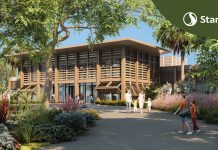
It seems the greens of Calusa Golf Course in West Kendall have been in the red for some time. The owner closed the Calusa Country Club in March and is proposing to develop the 168-acre property into an upscale senior community.
But with change, comes resistance and many concerned neighbors who live on the perimeter of the golf course are supporting a covenant that restricts the property’s use. The covenant, which dates back to 1968, stipulates that any development other than a golf course requires a waiver of the covenant be signed by 75 percent of the 144 homes that abut the golf course.
Tim Hyman, who represents owner Facundo Bacardi of the Bacardi rum family, recently conducted a community meeting to present the $200 million development concept, The Gardens of Calusa – Life Care Retirement Community, to the Calusa homeowners.
“The homeowners are concerned about traffic, their property values and their view,” Hyman said. “We understand that, which is why we are trying to create a total package that will enhance the quality of life of the residents that abut this property.”
Part of that package is a $50,000 payment per household which will be paid to 100 percent of the owners who sign the restrictive covenant waiver within two weeks of receiving it. After the two-week period expires, payment would be made only to those who make up the necessary 75 percent of the signatures needed.
“This money will be placed in escrow, ready to pay,” Hyman said. “This is a multi-million dollar giveback.”
The second part of the package addresses the homeowners’ backyard views. Hyman contends that the design philosophy of “The Gardens” is based on respecting the environment and enhancing the lifestyle of the perimeter homes and families. To replace the homeowners’ backyard views of the golf course, the site’s plan includes a 20-acre, 3.2-mile long, 50-foot wide linear park that would border the entire 168-acre property.
The park, which would include a Vita course, lakeside gazebos, fountains, sunset viewing areas, playground and putting green, will be for the exclusive use of The Gardens’ residents and the homeowners, who will each have a private path connecting their property to the park walkway.
Hyman said that the homeowners would have majority representation on a board that oversees the park, while The Gardens would maintain the park and provide 24- hour security.
One Calusa homeowner who plans to sign the waiver, but wanted to remain anonymous said, “Everyone’s first reaction is to fight, because it’s a change — and change is scary for some people,” she said. “I didn’t use the golf course, but my husband and I would probably use this park.”
For some homeowners, the development still falls short of warranting their signature to waive the restrictive covenant. Some worry that if they sign, it opens the door to other types of development, if this plan falls short. Not so says the Bacardi group, who assures homeowners that their signature will waive the covenant only for this specific development proposal.
Calusa homeowner Orlando Rodriguez said that he is worried that the value of his home will decrease now that it will no longer be “on the golf course.”
“The owners have offered us each $50,000, but I think our home values will decrease by more than that,” he said. “If they want us on their side, they’re going to have to offer more to compensate for that decrease.”
Barry Schimer, another Calusa homeowner, said that he does not support this development plan.
“This is not about business; these are our homes,” he said. “Would Mr. Bacardi like this development in his backyard?”
The proposed master plan of The Gardens of Calusa includes independent living cottages, assisted living villas and a nursing care facility, for a total of 960 dwelling units. The self-contained community will include dining areas, lounges, library, theater, ballroom, computer center, retail center, medical center, fitness center and spa and wellness center with an indoor swimming pool.
Even with all the amenities, Hyman is quick to point out that the building footprint on the property will be 11 percent, with the remaining 89 percent open space. The average setbacks of buildings from property lines will be 170 feet, and 380 feet for threestory buildings.
“We are planning a successful, viable working business and in the process of planning it. We’re trying to make everyone happy,” Hyman said.







Comments are closed.